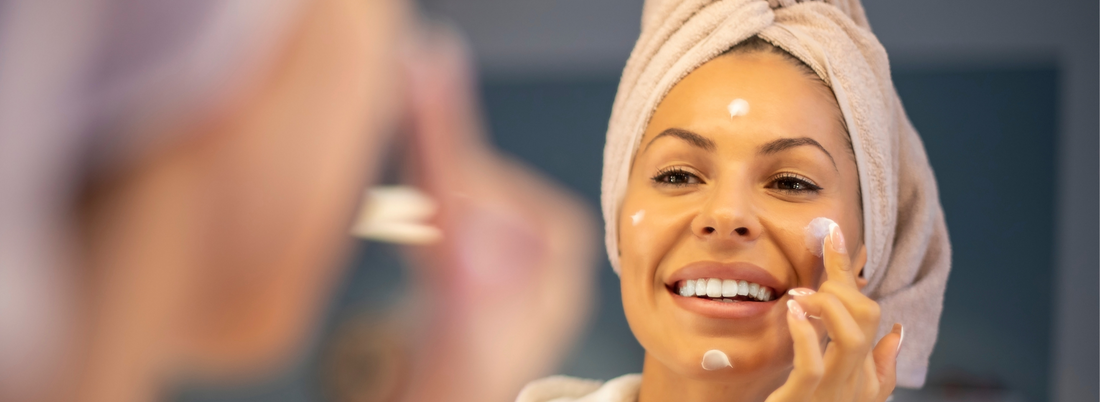The debate around using night creams during daytime hours isn't a new one. Some swear by it; others warn against it.
This post aims to clear up some of the fog surrounding this beauty conundrum. Can you actually use a night cream like our Rehydration Night Crème during the day? Are there hidden benefits or potential pitfalls we should know about?
If you're ready for answers that go beyond just skin deep - stick around! You'll learn more than just whether to swap out your morning moisturizer.
Understanding Night and Day Creams
You might be wondering, "What's the difference between night and day creams?" Well, it's not just a marketing gimmick. These two types of creams are formulated differently to cater to your skin's needs at different times.
Night creams like our Rehydration Night Crème, for example, are typically richer in texture and more moisture-intensive. They're packed with active ingredients that support skin repair while you sleep - when cell regeneration is at its peak.
The Secret Ingredients: Retinol and Hyaluronic Acid
Retinol is a common ingredient in many night creams because of its ability to accelerate skin renewal. It works by stimulating collagen production which helps reduce signs of aging such as wrinkles.
Hyaluronic acid is another key player often found in these nighttime creams. Imagine drenching your skin cells with all that moisture every time you slather on some night cream before bed.
Day Creams: More Than Just Sun Protection
Moving onto day creams now – they’re not simply glorified sunscreens but rather allies against environmental aggressors we face daily like pollution or wind damage. They also contain ingredients aimed at maintaining hydration levels throughout the day without making your skin feel heavy or greasy.
The Science Behind Night Creams
Have you ever wondered why night creams are often richer and more moisture-intensive than their daytime counterparts? The answer lies in our skin's natural rhythm. During the daylight hours, our skin strives to guard itself from outside stressors such as UV radiation and contamination. But at night, it switches gears to repair any damage incurred during the day.
Night creams are formulated with this in mind. They're packed with active ingredients such as retinol and peptides that support cell turnover, a process that naturally occurs while we sleep but slows down as we age. These powerhouse ingredients work overnight when your skin is most receptive, helping to restore elasticity and reduce the appearance of fine lines.
Trilipiderm’s Rehydration Night Crème: A Closer Look
Our Rehydration Night Crème, for instance, is an excellent example of a high-quality night cream designed for maximum efficacy. This product stands out due to its rich formula brimming with nourishing oils and plant-derived sterols that aid nighttime recovery by deeply moisturizing your skin.
Beyond just hydration though - it also contains potent antioxidants like Vitamin E which help fight off harmful free radicals accumulated throughout the day thereby preventing premature aging.
Can You Use Night Cream During the Day?
This brings us to an interesting question – can one use a night cream during daylight hours? While there isn’t anything inherently wrong about using them during daytime per se; remember they lack certain key components found in day creams like SPF protection against sun exposure which makes them less suitable under sunlight. Making informed choices based on the science behind skincare products is essential for creating a personalized routine.
The primary consideration here isn't time, but your skin's needs and how they're met by different creams. Night creams are typically heavier than their daytime counterparts, focusing on deep hydration and recovery. This makes them ideal for when our bodies naturally repair themselves – at night while we sleep.
If you decide to use a night cream during the day, remember it won’t give sun protection unless specifically stated in its formulation. Day creams usually contain SPF to shield from harmful UV rays - something most night creams lack because there’s no need for it as you’re likely under covers instead of sunshine.
If your skin feels dried out or parched during the day due to things like air conditioning and heating, a hydrating night cream could be helpful. But make sure it doesn't feel too heavy or greasy for comfort.
In short: yes, you could use a night cream during the day. Just be aware of what this choice entails: richer texture (which some may find too heavy) and the potential absence of SPF protection (unless specified otherwise).
Comparing the Effects of Day and Night Cream Usage
If you've ever wondered about using night cream during the day, let's explore this topic. Some believe it’s like wearing a winter coat on a hot summer day - unnecessary and uncomfortable. But is that really true?
Night creams are typically rich in hydrating ingredients, and designed to support skin repair while we sleep. Our Rehydration Night Crème, for instance, has powerful components aimed at overnight recovery.
Day creams on the other hand often contain SPF to protect against harmful UV rays. They're lighter than their nighttime counterparts, making them perfect under makeup.
Conclusion
Using a night cream, like our Rehydration Night Crème, can work wonders for your skin while you sleep. These creams are packed with powerful ingredients that help rejuvenate and replenish your skin overnight.
However, whether or not to use a night cream during the day is not a straightforward decision. It depends on various factors such as sun protection and your specific skincare needs. While there may be some benefits to using richer formulations during the daytime, it's important to remember that they do not replace the need for SPF protection.
Ultimately, creating a skincare routine tailored to your individual needs is crucial. Incorporating both day and night creams will likely yield the best results for healthy-looking skin. Shop our full collection of skincare products to find the options that work best for your skin's needs.



